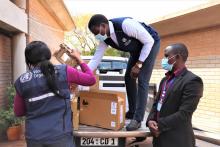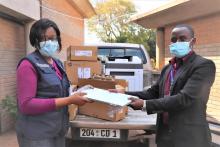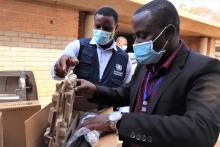Handover of office equipment to City of Harare’s new Emergency Operations Centre (EOC)
by Tatenda Chimbwanda
Harare, Zimbabwe - The World Health Organization (WHO) Zimbabwe, with financial assistance from the United Kingdom's Department for International Development (DfID), handed over office equipment worth $12,390 to the City of Harare’s new Emergency Operations Centre (EOC) stationed at Wilkins Infectious Diseases Hospital. Wilkins Infectious Diseases Hospital, is the main COVID-19 isolation center for Harare.
Harare is the epicenter of Covid-19 with the highest number of cases in the country, currently at 1,670 as of 5 August 2020. As such, central coordination and data management becomes imperative for the capital city’s COVID-19 response. Presently, the City of Harare’s COVID-19 response coordination has been challenging with the different COVID-19 thematic pillars working from different locations in the city.
This has resulted in difficulties in properly coordinating the City’s COVID-19 response efforts. In a bid to address this, the City Council converted and renovated the Wilkins Hospital old lecture theater room as the EOC for Harare a month ago. However, the EOC setup had not been fully operational due to the lack of availability of essential equipment needed to run it. “The EOC needs to be very convenient in terms of data availability and sharing which has not been possible without office equipment such as computers,” explained Louis Mukumba Wilkins Principal M &E Officer during the hand over.
“On behalf of our team, l am deeply humbled and extremely grateful for WHO’s donation. Now that we have received the office equipment in form of desktops, laptops, printers and projectors, we are actually going to move all the EOC staff from their different locations to all start working under one roof next week,” added Louis.
Complementing WHO’s donation, the United Nations Population Fund (UNFPA) will also be supporting the new EOC with internet and transport to assist the staff.
Health information and real live data is extremely important during any outbreak. Accurate real time data allows individuals and key stakeholders to make the most informed decisions and also keep people safer during the COVID-19 pandemic. Henceforth, in order for the data to be generated laptops, computers and internet are required.
The new EOC will serve as the central coordination hub for City of Harare COVID-19 response and any other future health emergencies. This will help coordinate the efforts of the different thematic pillars representatives as they will now be working under one roof. Additionally, the EOC will also have their own COVID-19 call center for Harare to address the recent communication breakdown. All the communication will be done through the new EOC call center. This will improve information flow and alerts from the public regarding the outbreak. The new EOC will also serve as a venue for trainings, data collection, analysis and data sharing.
The handover of office equipment took place within the framework of WHO’s COVID-19 emergency response program. The financing and procurement of office equipment and technical support are a significant contribution of DFID efforts to strengthen Zimbabwe’s COVID-19 response. WHO and UNFPA together with various partners, continue to support the City of Harare’s COVID-19 response.
“As WHO we will continue to make available our resources both technically and otherwise to support the efforts of the city and the country to bring this outbreak under control in the shortest possible time,” concluded Dr Irene Isibor, from WHO.
Communications Officer
Tel: + 263 914 31408
Email: juliasw [at] who.int (juliasw[at]who[dot]int)





